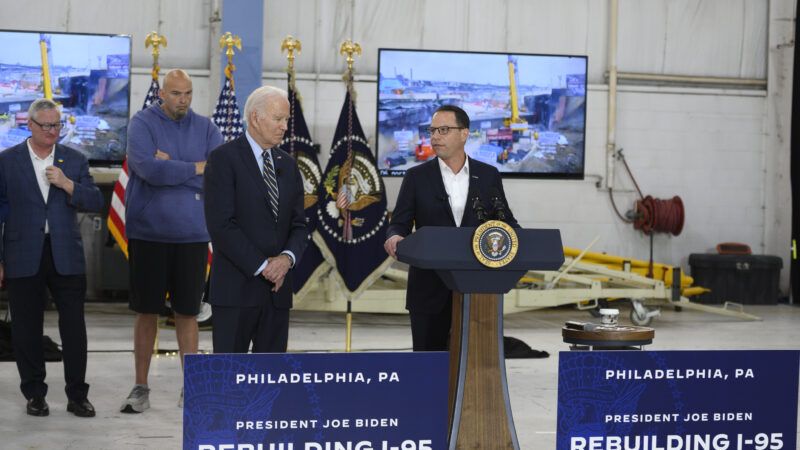The Absence of a 'Carmageddon' After the Philadelphia Bridge Collapse Doesn't Prove Highways Are Useless
The closure of I-95 is a teachable moment. But highway critics are learning the wrong lesson from it.

The collapse of the I-95 bridge in Philadelphia has provided a great teachable moment about the phenomenon of induced demand. Sadly, many people are learning the wrong lesson from the episode.
When the bridge collapsed earlier this month, forcing a section of the urban highway to close to traffic, transportation officials and the media predicted nightmarish traffic to be the result. This didn't happen.
As a recent Vice article by Aaron Gordon notes, traffic backed up in some areas near the closed highway, but otherwise people switched to alternate routes, took transit (Philadelphia's transit agency saw ridership rise 14 percent), traveled at different times, or didn't travel at all.
Gordon describes the lack of disaster as a result of "induced demand."
This is the idea that increases in road capacity lead people to travel more. The implication is that wider highways don't necessarily lead to faster travel times. According to Gordon, the lack of a "Carmageddon" is evidence of the phenomenon in reverse: road capacity shrank, driving fell, and traffic stayed about the same.
Over at Streetsblog, Joe Cortright uses this insight about why a carpocalypse didn't materialize in Philadelphia to argue that we should stop expanding highways and that we could generally do with fewer of them.
"Highway departments claim that if we don't build more roadways, traffic and congestion will increase without limit and we'll face hours and hours of delay. In reality, that never happens because people adapt their travel behavior to the available transportation system," wrote Cortright. "More capacity generates more travel, more sprawl, more pollution, and ultimately more congestion. It's time to get off this treadmill."
This is a confusing takeaway for a couple of reasons.
First, even though a traffic disaster didn't follow the bridge collapse disaster, travelers in Philadelphia are still worse off.
The public transit and alternate routes that people took instead of I-95 existed before the road was closed. People didn't take them because they presumably took longer, were less convenient, or had some other cost that made traveling on the interstate preferable. The same is true for people who chose not to travel at all. The rising hassle of driving means that they've lost whatever benefits they would have gotten from the trips they now aren't taking.
There's a net welfare loss to society happening here. Conversely, when cars fill up the reopened I-95 bridge, that will be evidence that travelers' lives are getting better.
It's a similar story with highway expansions generally. The fact that they fill up with traffic shows that there was unmet demand for highway travel that's now being served.
The existence of induced demand (latent demand would be a better term) is a point in favor of highways and road capacity, not against them.
That doesn't mean every highway widening is a good idea or every existing highway is worth its costs.
"There are locations where the cost of adding freeway capacity may significantly exceed the benefits to highway customers," wrote Bob Poole, director of transportation policy for the Reason Foundation (which publishes this website) in 2019. "When that is the case…the solution is to implement congestion pricing. And in some of those cases, the additional revenue from pricing may be high enough to make the capacity addition feasible."
Similarly, if the dislocations from a closed urban freeway are so minimal as to be insignificant, then it could be the case that the costs of maintaining or rebuilding it aren't worth it.
That doesn't seem to be the case in Philadelphia.
The first travelers across the reopened I-95 today were a bunch of Philly sports mascots. People seem to think being able to use the bridge again is something to celebrate.
The Philly mascots were the first to cross the reopened I-95 bridge.
What a city.https://t.co/l5xzzEgSvg
— Barstool Philly (@BarstoolPhilly) June 23, 2023
The Phillie Phanatic seems to have grasped a point that's eluded some highway critics. Yes, induced demand is a real thing, but it's also a good thing.
Rent Free is a weekly newsletter from Christian Britschgi on urbanism and the fight for less regulation, more housing, more property rights, and more freedom in America's cities.


Show Comments (92)